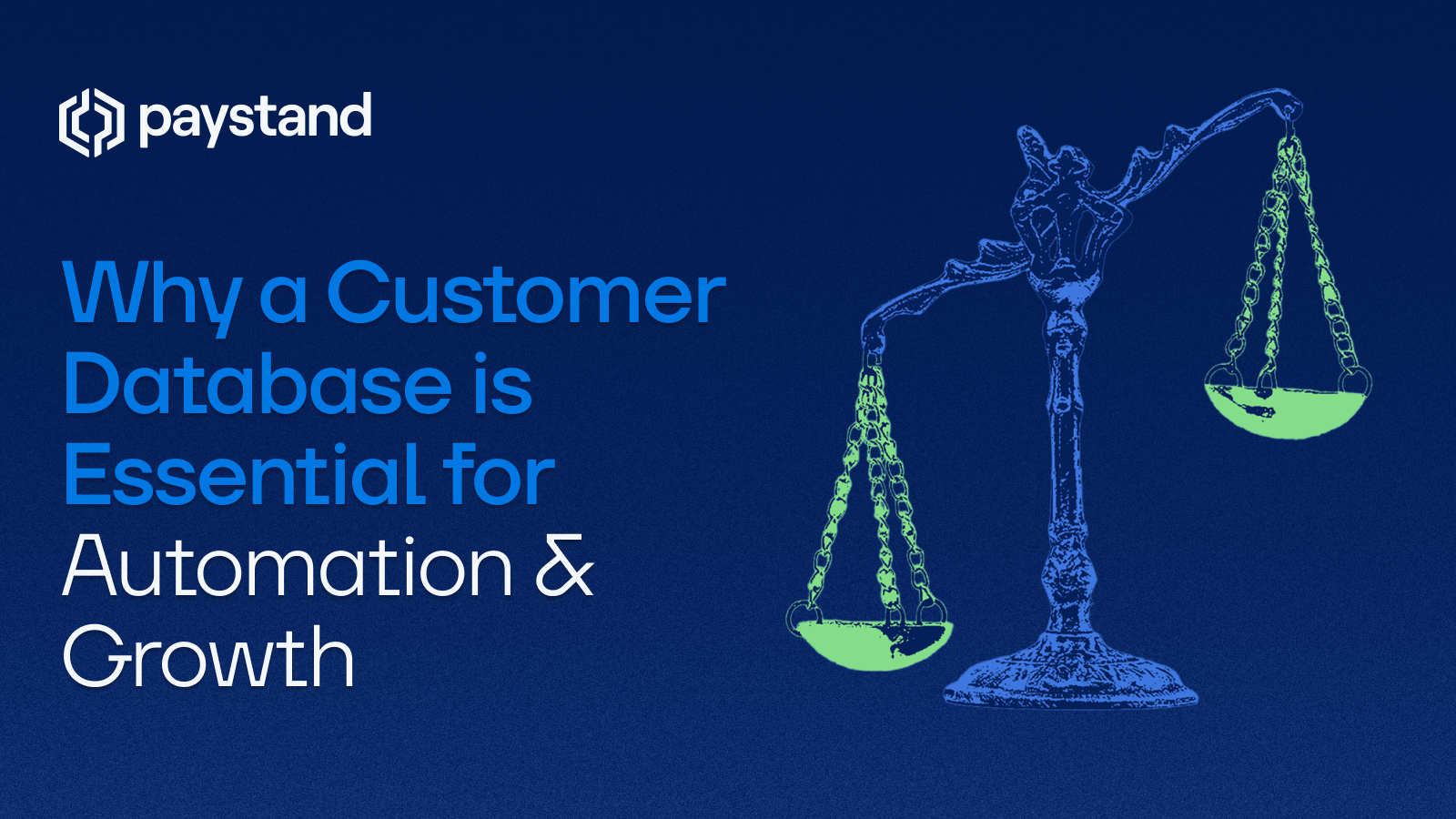Why a Customer Database Is Essential for Automation and Growth

Table of Contents
- Why Is a Customer Database Important?
- What Is the Importance of a Database?
- Types of Databases
- Key Benefits of a Customer Database
- The Primary Goal of a Customer Database
- Is a Customer Database Safe?
- Paystand’s Commitment to Database Security
Key Takeaways
- A customer database centralizes, organizes, and protects vital customer information for better business performance.
- Reliable data enables personalized marketing, customer retention, and real-time decision-making.
- Databases support customer relationship management, improving trust and long-term engagement.
- Security and compliance are non-negotiable—modern platforms like Paystand use encryption and advanced controls to protect your data.
- To get even more value from your database, implement customer segmentation in accounts receivable and other automated strategies that boost cash flow and reduce DSO.
Much has been said about the countless advantages of automating accounts receivable (AR) processes—saving time, reducing manual work, and accelerating growth. But automation can only perform as well as the data powering it.
A well-structured customer database ensures all gears of your AR system move in sync, keeping every record accurate, accessible, and secure. It’s the central hub that connects your customer interactions, purchase history, and data analysis—enabling faster decision-making and stronger customer relationships.
Having a customer database means accessing real-time, organized information in one click. It’s not just a technical tool—it’s one of your business’s most valuable assets.
Why Is a Customer Database Important?
Information is one of the most precious resources a company has, but it’s constantly changing. A customer database captures that information in a structured, reliable way—helping marketing teams, customer service, and finance leaders stay aligned.
An effective database allows you to:
- Build detailed customer profiles based on behavior, preferences, and purchase history.
- Deliver personalized marketing and targeted marketing messages to increase engagement.
- Improve customer trust and long-term retention by keeping customers informed and connected.
- Support data-driven decisions that enhance business financial management and operational efficiency.
For related insights on improving financial strategy, see Finance Decision-Making: How to Lead with Data.
What Is the Importance of a Database?
Databases are not just for storing data—they are essential for data collection, organization, and analysis. In a business context, they:
- Centralize all customer information (like email addresses, contact details, and transaction history) in one place.
- Enable customer relationship management (CRM) systems to provide 360° visibility into every customer touchpoint.
- Help ensure accurate invoice management and automated workflows that reduce manual errors.
When integrated with AR automation tools like Paystand, a database becomes the foundation for seamless digital payments, customer segmentation, and optimized customer payment experiences.
Types of Databases
Different databases serve different business needs, but all aim to store and secure information efficiently.
- Relational databases: The most common type, organizing data in structured tables for easy querying and updates.
- Distributed databases: Data is replicated across multiple physical locations for higher availability—blockchain systems are a prime example.
- NoSQL databases: Designed for scalability and handling large volumes of unstructured data.
- Object-oriented databases: Encapsulate information as “objects,” ideal for complex, interrelated data like customer interactions or product histories.
Key Benefits of a Customer Database
1. Centralized and Real-Time Access
Cloud-based databases give your teams immediate, real-time access to customer data from anywhere. This eliminates data silos, keeps marketing teams and finance departments aligned, and accelerates decision-making.
2. Data Accuracy and Consistency
A well-managed database prevents duplicate or outdated records, ensuring that customer profiles, purchase history, and preferences stay current. This leads to better customer service and fewer operational errors.
3. Improved Customer Retention
Accurate data allows you to tailor experiences and anticipate customer needs. For example, data analysis of past interactions helps predict buying behavior and strengthens long-term customer relationships.
4. Personalized Marketing
With a structured database, businesses can segment audiences for personalized marketing campaigns, send targeted marketing messages, and measure engagement with precision. This directly supports customer retention and higher ROI.
5. Enhanced Customer Relationship Management
Integrating your database with CRM tools allows for a holistic view of each client, enabling proactive communication, informed follow-ups, and faster resolution of issues.
For more on improving customer experiences through automation, visit Customer Payment Experience: Why It Matters.
The Primary Goal of a Customer Database
The main objective of maintaining a customer database is to store and manage valuable information that enhances customer relationships and business efficiency.
When used effectively, a database helps:
- Keep customers informed about new products or services.
- Streamline data enabling for automated workflows in AR and marketing.
- Empower data-driven finance teams to forecast demand, reduce DSO, and optimize cash flow.
A well-maintained database is also key to Customer Segmentation in Accounts Receivable, allowing businesses to identify high-risk accounts, improve collections, and enhance overall financial performance.
Is a Customer Database Safe?
Yes, when properly managed, databases can strengthen your organization’s data security. Businesses must comply with standards like the General Data Protection Regulation (GDPR) to ensure responsible data handling.
Key security practices include:
- Encrypting sensitive data (such as email addresses and purchase history).
- Limiting access to authorized personnel.
- Backing up data regularly to prevent loss or corruption.
These measures not only protect your company but also reinforce customer trust and long-term loyalty.
For more, read Payment Compliance in Digital Payments.
Paystand’s Commitment to Database Security
As a platform built to optimize AR automation and unify ERP systems, Paystand’s infrastructure relies on robust databases that ensure security, scalability, and accuracy.
We safeguard your data through:
- Bank-grade security: All data is encrypted during transfer and at rest using AES-256 encryption.
- Advanced management controls: Role-based access prevents unauthorized use.
- Password hashing: Converts user passwords into unreadable strings for maximum protection.
Our focus is not only on keeping information secure but also on enabling your business to grow confidently by automating workflows, improving efficiency, and protecting your most valuable asset: your data.
Ready to enhance your customer database and take your AR automation further?
Read more about Customer Segmentation in Accounts Receivable








%20(1)%20(1).jpg?width=100&height=100&name=IMG_3752%20(1)%20(1)%20(1).jpg)